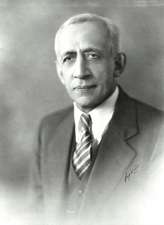Edward P. Costigan
| Edward P. Costigan | |
|---|---|
 | |
| United States Senator from Colorado | |
|
In office March 4, 1931 – January 3, 1937 | |
| Preceded by | Lawrence Cowle Phipps |
| Succeeded by | Edwin Carl Johnson |
| Personal details | |
| Born |
July 1, 1874 King William County, Virginia |
| Died |
January 17, 1939 (aged 64) Denver, Colorado |
| Resting place | Fairmount Cemetery (Denver, Colorado) |
| Political party | Democratic |
| Education | Harvard University |
| Profession | Law |
Edward Prentiss Costigan (July 1, 1874 – January 17, 1939) was a Democratic Party politician who represented Colorado in the United States Senate from 1931 until 1937. He was a founding member of the Progressive Party in Colorado in 1912.
Early life and education
Edward Prentiss Costigan was born in King William County, Virginia in 1874. He graduated from Harvard University in 1899.
Career
The following year, he moved to Denver, Colorado, where he had gotten his first position as a lawyer.
Costigan was a founding member of the Progressive Party in Colorado in 1912, but lost the election for governor. President Woodrow Wilson appointed Costigan as a member of the United States Tariff Commission in 1917.
He was elected to the United States Senate as a Democrat in 1930. Oscar L. Chapman managed his campaign.
In 1934 he co-sponsored the Jones-Costigan amendment to the U.S. Sugar Act, protecting the U.S. sugar industry, including sugar from Colorado beets.
Costigan-Wagner Bill
Colorado Democratic Senator Edward P. Costigan and New York Democratic Senator Robert F. Wagner sponsored a federal anti-lynching law in 1934. In 1935 Senate leaders tried to persuade President Franklin D. Roosevelt to support the Costigan-Wagner Bill. Roosevelt was concerned about a provision of the bill that called for the punishment of sheriffs who failed to protect their prisoners from lynch mobs. He believed that he would lose the support of the white voters in the South by approving this, and lose the 1936 presidential election.
The Costigan-Wagner Bill received support from many members of Congress but the Southern bloc managed to defeat it in the Senate. The national debate that took place over the issue again brought renewed attention to the crime of lynching. By the mid-1930s, the rate of the crime had finally dropped, mostly below 20 annually.
Further-reading
- Greenbaum, Fred. Fighting progressive: A biography of Edward P. Costigan (Public Affairs Press, 1971)
- Greenbaum, Fred. "The Anti-Lynching Bill of 1935: The Irony of ‘Equal Justice—Under Law.’." Journal of Human Relations 15#3 (1967): 72-85.
External links
- United States Congress. "Edward P. Costigan (id: C000797)". Biographical Directory of the United States Congress.
- Find-A-Grave profile for Edward P. Costigan
| United States Senate | ||
|---|---|---|
| Preceded by Lawrence C. Phipps |
U.S. Senator (Class 2) from Colorado 1931–1937 Served alongside: Walter Walker, Karl C. Schuyler, Alva B. Adams |
Succeeded by Edwin C. Johnson |
